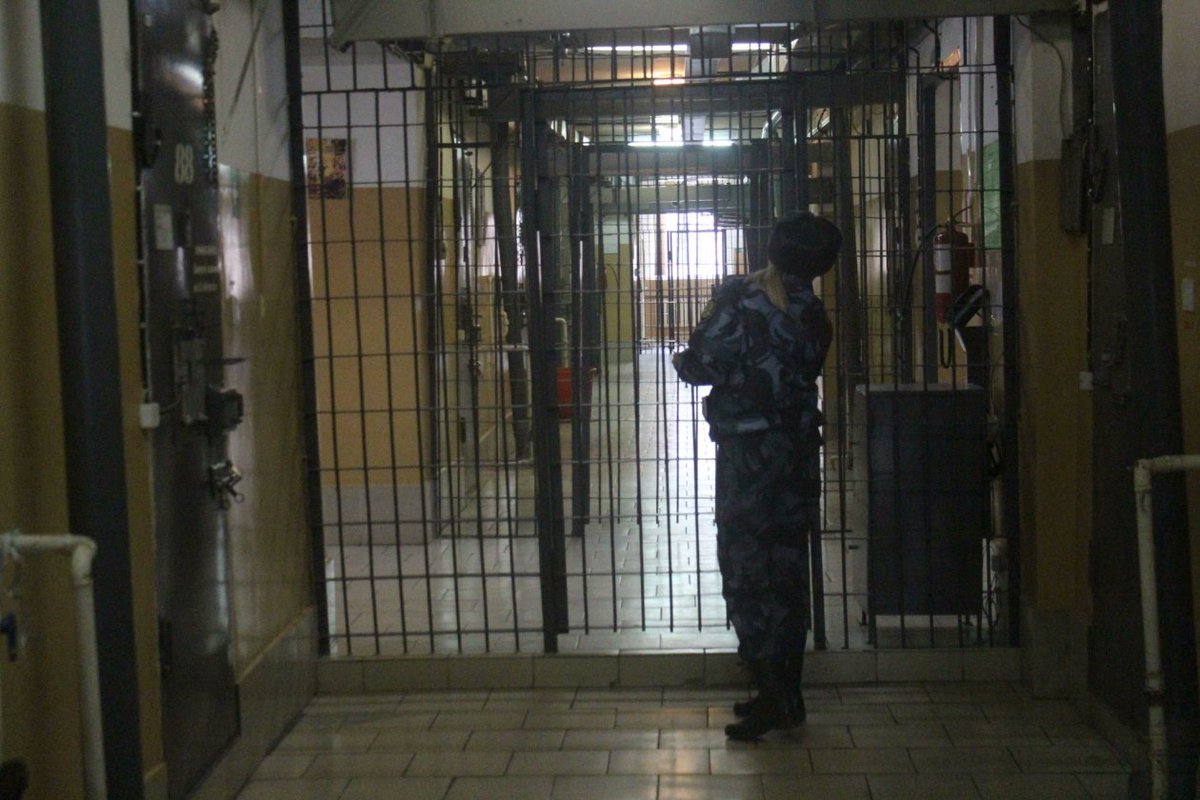1/ Russians soldiers fighting in Ukraine are subjected to a variety of arbitrary, brutal and illegal disciplinary methods, such as beatings, being imprisoned in pits, or being chained to trees for days at a time. Commanders kill their own soldiers and conceal their deaths. ⬇️ 

2/ Discipline is meted out by commanders and military police for offences including the use of alcohol or drugs, refusal to obey orders, insubordination or travelling without the right permits. While some are taken away to torture facilities, many are dealt with on the spot.
3/ Siberia.Realities describes the ordeal of Alexey Kulyayev, a mobilised man from Novosibirsk, who has been chained to a tree by order of his commander since 26th August. He was able to contact the news outlet using a mobile phone smuggled to him by sympathetic comrades.
4/ In 2022, Kulyayev was mobilised after being arrested for getting into a dispute with a policeman. He was given a suspended sentence and was sent to Ukraine, where he survived brutal fighting near Kreminna in the Luhansk region. He was allowed to return home in July 2024.
5/ Due to an apparent bureaucratic error, Kulyayev found himself listed as a deserter in August. "It turned out that my old regiment was disbanded, I was attached to a new one (the 239th regiment) and put on the wanted list." He was sent back to Ukraine despite health problems.
6/ Kulyayev found that his new regiment, which was stationed near Avdiivka, was terrorised by brutal and incompetent commanders. "I am horrified by the local customs – they drink non-stop, the whole regiment is a mix of conscripts, contract soldiers and recruited convicts.
7/ "The command walks around drunk and picks on the soldiers, and they treated us, the new arrivals, like shit."
Kulyayev was equally horrified by how the commanders extorted money from their soldiers and sent them virtually unprotected into assaults.
Kulyayev was equally horrified by how the commanders extorted money from their soldiers and sent them virtually unprotected into assaults.
8/ "They send us to assault with 1-2 [clips] of ammunition, what kind of cover?! They send us without body armor. Without drones – there is simply not a single working drone here!
9/ "It’s not just extortions like “let’s chip in for fuel” – they demand tens of thousands to chip in (one company commander of another squad spent 600,000(!) rubles [$6,700] in one day – the soldiers allocated the money to buy uniforms, and he spent it on himself).
10/ "If it was tough near Kreminna, then here it’s just hell. The survival rate is zero. No one returns from assaults."
11/ When Kulyayev asked his commander, Colonel Myasnikov, not to humiliate his men, the colonel "responded: "Oh, you are assholes, fuckers", his deputy grabbed me by the throat and started to strangle me. And he [Colonel Myasnikov] immediately ordered me to be chained up. 

12/ The same was true for the other guys who tried to stand up for me. At night, when I was sleeping chained to the ground, several people surrounded me – with a gas canister in my face – and started kicking me from all sides: "Count the days, bitch, until your death."
13/ "You'll die in the assault or we'll shoot you and write you off as [a combat fatality]." I don't know why exactly. And I don't know how many of us are chained – all of those who arrived or not. But I see that many of the beaten ones are walking by."
14/ According to another soldier, a man chained to a tree has to "take a shit in a bag, pee in a bottle. You can't eat, you can't smoke either." Kulyayev's friends managed to smuggle a phone to him on the fifth day of his chaining so that he could get word to his wife.
15/ "Good health, please help, they want to beat us up badly or kill us and write us off, as if we were on a combat mission or something else, regiment 239 military unit 89547 urgently urgently Kulyaev A.V.”, he wrote.
16/ Despite the fact that "hugging a birch," as it's known, is an illegal punishment, nobody responded to Kulyayev's wife's appeal for help. The wife of another mobilised soldier in the same regiment says that "such procedures are normal there."
17/ "Beat a person, put him on a chain, put him in a pit, threaten to kill him, and then "write off his death as a death in combat". Just for nothing better to do. And imagine if a person refused to fight? Such people are really killed, no prosecutor's office will help."
18/ Sergei, a friend of Alexei's, faced similar treatment after recording a video appeal to Vladimir Putin. Corruption or incompetence led to his unit being sent rotten fruit and industrial water, which Sergei says “fucked everyone up.”
19/ The appeal resulted in Sergei's commanders ordering him to be severely beaten, inflicting head and face injuries. For daring to complain, he was tied to a tree and threatened with being thrown "on the contact line" or shot.
20/ Sergei was later "forced to write that he allegedly found rotten fruit with the inscription "for Putin" in a garbage dump and collected it himself in a basket."
21/ The Russian military has a well-developed military justice system which theoretically bans such treatment. However, brutality is a long-standing tradition in the Russian army, going back to Tsarist times, and "prophylactic beatings" are commonplace.
22/ Russian soldiers have always faced what one historian describes as "brutal and often grossly unfair discipline". Soldiers are often more afraid of their own commanders than of the enemy.
23/ Officers in Tsarist times regarded their men "in the light of some sort of cattle, from whom one might demand as much service as one liked, and to whom it was only necessary to grant a very little rest, food, or clothing." Not much appear to have changed since then. /end
Source:
sibreal.org/a/nas-hotyat-u…
sibreal.org/a/nas-hotyat-u…
• • •
Missing some Tweet in this thread? You can try to
force a refresh












